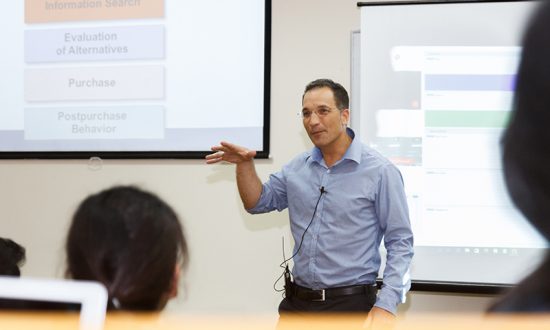Nicolas Hamelin is an Associate Professor and the Director of S P Jain School of Global Managements’ neuroscience lab in Sydney. His main research interests are in the fields of Neuromarketing, Social Marketing, PR and Environmental Communication. Nicolas holds a Ph.D. in Physics from Sussex University in the UK, an M.Sc. in Environmental Management from Ulster University, and a PhD in Business at the Royal Docks Business School from the University of East London. He is also a qualified TV news reporter from INA, Paris. He is the founder of Mindbci a neuroscience start-up based in Sydney and Singapore. In international business, he was a strategic marketing manager for STmicroelectronics, Nokia Business Unit for over 10 years, a principal scientist at the Foundation for Fundamental Research on Matter and the Energy Center, Netherlands.
Understanding Consumer Behaviour: Humans are complex; their decision-making processes have always been subject to stormy debates. Understanding human decision making and constructing models of human behaviour is key to businesses and society. Before making a decision, a consumer will consider a wide array of characteristics, from product design, user experience, shape, material, colour, pricing and packaging design. However, our perception of the world is grossly inaccurate since it relies on the interpretation of external stimuli, sight, sound, smell, touch. These stimuli are analysed by our brain, however far from being analysed rationally they first pass through a bottleneck – The Limbic system – regions of the brain that process emotions and primal feelings like pain and disgust. Buying decisions depend significantly on these unconscious emotions, hence recognizing your target market’s affective response is essential.
Neuroscience Education: Neuroscience education focuses on providing businesspeople and decision makers with actionable knowledge of human decision-making concepts and provides them practical skills to be able to measure a person’s unconscious response to various marketing stimuli. The fundamentals of Neuroscience education focuses on acquiring the knowhow to measure a person autonomic body reaction, or in other words unconscious bodily reaction. Neuromarketing students will learn to assess which cues on a package, ads or website a person is looking at (attention) and whether these cues are generating positive or negative emotional arousals. There is a direct synchronicity between the brain decision making process, gaze and attention. The human brain unconsciously focuses its attention to the cues that are considered important to make a choice and ignore cues which appear irrelevant – all this process is done mostly at the unconscious level.
Benefits of Practical Neuroscience education: Neuroscience education will teach product developers, marketers, or advertisers how to use eye tracking, galvanic skin response detection, and facial expression analysis to scientifically evaluate which cues are central to the decision making process in order to maximise consumers’ cognitive and emotional responses to their packages, websites, ads, supermarket display, price tags and so on. Students will learn to explore the subconscious of consumer behaviour by evaluating the body’s autonomic response to a marketing stimulus. They will learn why altered emotional state changes the heartbeat rate of the respondents, dilate the pupil and trigger changes to the skin’s electrodermal response. A simplistic explanation lies in how the brain processes information. For every stimulus, we experience – the limbic system, associates to each stimulus an emotional valence: positive, negative, or neutral. So, humans’ brain does not only process the information but also the emotions associated to this stimulus. The emotional valence associated to a given stimulus will then be processed by various regions on the brain impacting visual attention, retention, motivation, and decision making. Good salespeople are able to create an emotional connect with potential buyers, hence persuading them to buy their goods, nowadays in our digital worlds researchers have proven that online incidental similarities on social media platform such as sharing the same passion generate positive emotions and increase the likelihood of sales.
Supporting market strategy with Neuromarketing education: Traditional market research focuses on data collection based on self-report methods such as a questionnaire. However questionnaires provide poor customer insight since they rely on consumer conscious thought process while 95% percent of all cognitive process such as buying decision, viewer engagement, attention, learning, and recall takes place in the subconscious mind. The use of neuromarketing has become fully integrated to large organisations’ products and marketing strategy (Unilever, Hyundai, Paypal and Microsoft). Likewise leading marketing research companies are increasingly relying on neuromarketers to support their corporate customers. A Neuromarketing education will provide businesspeople with the skills needed to understand customer’s motivation, engagement and buying decision and support their organization marketing strategy.




